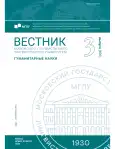Comparison of the Value “Arbeit” (work) in German and Austrian Linguistic Cultures
- Авторлар: Khlopova A.I.1
-
Мекемелер:
- Moscow State Linguistic University
- Шығарылым: № 3(897) (2025)
- Беттер: 144-150
- Бөлім: Cultural studies
- URL: https://journal-vniispk.ru/2542-2197/article/view/286514
- ID: 286514
Дәйексөз келтіру
Аннотация
The aim of the article is to compare the value “work” in German and Austrian linguistic cultures. The research material is the data of free associative experiments conducted with native speakers of German and Austrian linguistic cultures, presented in the Austrian-German-Russian associative dictionary of basic values. The field method and subjective scaling are used in processing the material. The comparative method, analysis and synthesis, and quantitative processing of experimental data are used to study the material. As a result, it was found that the attitude of German and Austrian respondents to work is different. For German respondents, work is a way to achieve material benefits, while for Austrian respondents, it is an opportunity for self-realization and career success.
Негізгі сөздер
Авторлар туралы
Anna Khlopova
Moscow State Linguistic University
Хат алмасуға жауапты Автор.
Email: chlopova_anna@mail.ru
PhD (Philology), Associate Professor, Associate Professor at the Department of German Lexicology and Stylistics, Faculty of the German language, Associate Professor at the Department of General and Comparative Linguistics, Leading Researcher, Laboratory of Psycholinguistics
РесейӘдебиет тізімі
- Khlopova, A. I. (2017). Various approaches to verbal diagnostics of the dynamics of basic values (using the basic value “work” as an example). Gumanitarnoe obrazovanie i nauka v tekhnicheskom vuze (pp. 322–327): sbornik dokladov Vserossijskoj nauchno-prakticheskoj konferencii s mezhdunarodnym uchastiem. 2017.
- Erastov, B. S. (2002). Civilizacionnoe ustroenie obshchestva: universalii i samobytnost’ = Civilizational structure of society: universals and originality. Moscow: Nauka. (In Russ.)
- Adler, A. (1964). Social interest: A challenge to mankind. New York: Capricorn Books.
- Rоkеасh, М. (1973). The Nature of Human Values. N.Y.: Free Press.
- Arutyunova, N. D. (2000). Naivnye razmyshleniya o naivnoj kartine yazyka = Naive reflections on a naive picture of language. Moscow: YAzyki russkoj kul’tury. (In Russ.)
- Karasik, V. I. (2002). YAzykovoj krug: lichnost’, koncepty, diskurs = Language circle: personality, concepts, discourse. Volgograd: Peremena. (In Russ.)
- Leont’ev, A. A. (1971). Semanticheskaya struktura slova. Psiholingvisticheskie issledovaniya = Semantic structure of the word. Psycholinguistic research. Moscow: Nauka. (In Russ.).
- Lur’e, S. V. (2016). Russian National Project: Cultural «Keep-Clips» and «Scripts» (Theory and Practice). The Bulletin of Moscow State university of culture and arts, 1 (69), 44–50.
- Stefanenko, T. G. (2009). Ethnic Identity: From Ethnology to Social Psychology. Lomonosov Journal of Philology, 2, 3–17. (In Russ.)
- Pishchal’nikova, V. A. (2021). Istoriya i teoriya psiholingvistiki = History and Theory of Psycholinguistics. Moscow: R. Valent. (In Russ.)
- Temnickij, A. L. (2005).Workers attitudes to labor in Russia and Germany: the terminal and the instrumtntal. Sociological Studies, 2005, 9(257), 54–63.
- Nikonova, A. R. (2015). Avstrijskost of the Austrians: linguistic objectivation. Sovremennye problemy nauki i obrazovaniya, 1(1), 1145. (In Russ.)
Қосымша файлдар










